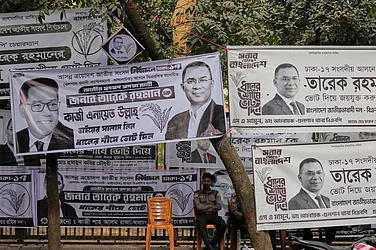Pakistan’s squabbling parties have plunged the country into a political crisis at a time when all hands on deck are needed to shore the country’s sliding economy. Soaring prices, dwindling foreign exchange reserves, and shrinking the rupee against the US dollar are warning signs of a fragile economy.
Pakistan is in talks with the IMF to resume lending under an arrangement for a $6 billion loan struck in 2019. But the IMF stopped the loan schedule halfway through over differences with the Imran Khan government over stopping subsidies on oil. The new Shehbaz Sharif government has also failed to persuade the IMF to continue the rest of the loan without further burdening the already suffering public. Sharif is well aware that sooner or later elections will have to be called, and hiking fuel prices will anger the common man, already saddled with high prices of food.
Like Imran, Shehbaz Sharif is reluctant to go by the IMF's tough prescription. Officials are negotiating with the IMF to release the remaining $ 3 billion, but the going is tough. So far no agreement has been reached, though it is fair to point out that the situation is much worse today with commodity prices including wheat rising thanks to the war in Ukraine. Unless something is done soon, and the government is willing to swallow the bitter pill offered by the IMF, Pakistan may soon go the Sri Lanka way.
Political uncertainty worsens the situation, but politicians are unwilling to stop their endless squabbles. The foreign exchange reserves have dwindled to a mere $10.2 billion, just enough to carry imports through for just about two months.. According to reports from Islamabad, Pakistan is looking to have a $45 billion trade deficit by the end of the year. Are the politicians deaf to these concerns though each party is aware of the consequences?
After a show of strength by Imran Khan on Wednesday when his supporters breached the high-security Red zone and the army had to be deployed, the Pakistan Tehreek-e-Insaf (PTI) leader had given a six-day ultimatum to the government to call for national elections or they would be back in strength to force the government to concede.
Imran Khan blames the US for removing him from power and joining hands with the ``looters’’ of Pakistan, Mian Nawaz Sharif, and the Bhutto-Zardari families, and foisting an ``imported’’ government on Pakistan. According to Imran Khan, his independent foreign policy had put off US President Joe Biden and led to his ouster. Many ordinary Pakistanis who have turned anti-American buy this story, despite repeated denial by Washington. Support for the former charismatic cricketer turned politician is at an all-time high, with ordinary people, celebrities and many former bureaucrats joining the Imran band wagon. Imran Khan is smelling victory and going for the kill. But the army, which helped him to come to power and kept coalition allies by his side is no longer supporting their former protegee.
So far Pakistan military, usually the movers and shakers in times of political turmoil has stayed away from the political fracas. Why Khan and the military top brass fell out is not known but the army has suddenly found virtue in neutrality. This has angered Khan who declared that only animals are neutral. Khan has been taking on the army with broad asides and appears to have burnt his bridges with Rawalpindi. If the army remains neutral it is good news for Pakistan.
The government of Prime Minister Shehbaz Sharif is busy trying to douse the flames lit by the ousted former prime minister bent on forcing an election on the country. Nor has the Pakistan Muslim League, covered itself in glory. Instead of rising above petty political squabbles, the government had gone all out to thwart the protests. Like the previous PTI regime, Sharif used the full power of state agencies to browbeat PTI supporters. Raids in offices and homes of former PTI ministers and leaders have unleashed ahead of the march.
Shehbaz Sharif’s government appears to be on the backfoot and thrashing around for a way to deal with the massive protests across Pakistan. In Parliament, the Prime Minister has made it clear that elections will be held but at the time finalised by the coalition government. Imran Khan’s ultimatum will clearly be ignored. What Khan does after the six-day ultimatum is done is not known. But he is unlikely to quietly accept the government’s decision.
The less the politicians turn to GHQ for help and advice the better for the future of the country. But for now, the main issue is stabilizing the economy and ensuring that Pakistan does not go the Sri Lankan way.



























